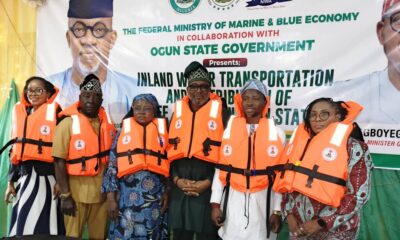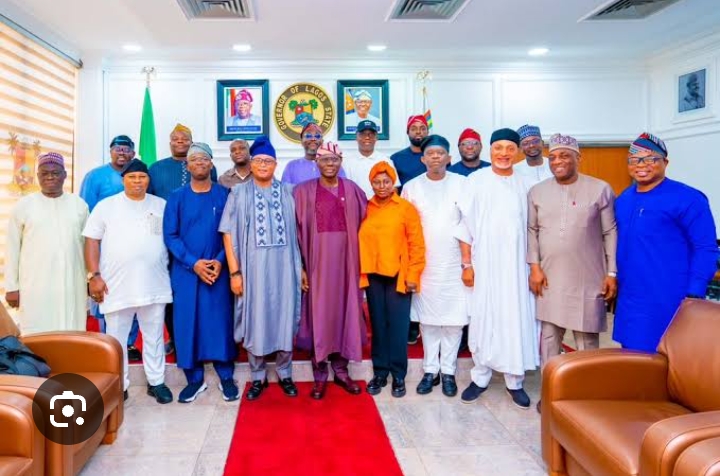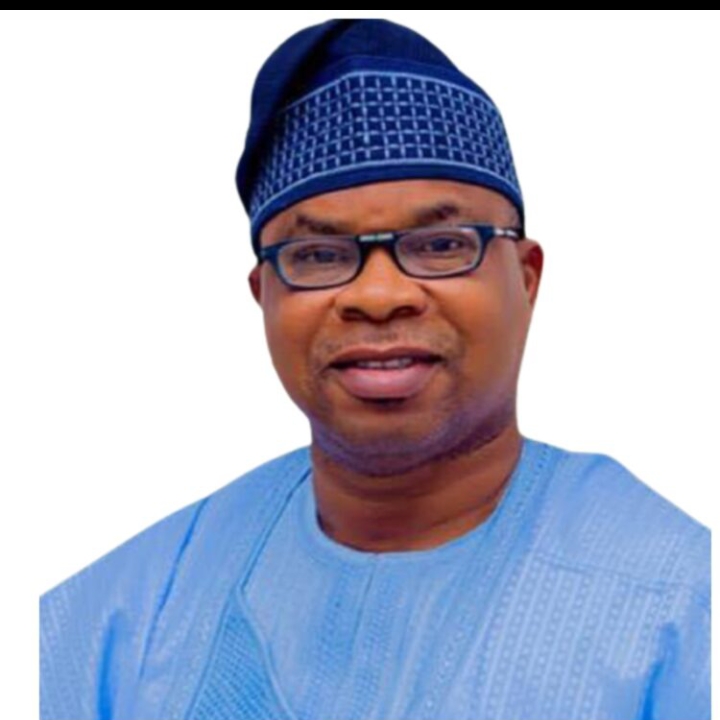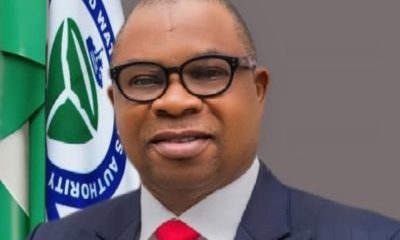Maritime Agencies
INLAND WATERWAYS SECURITY: China Urges Nigeria To Adopt Her Technology For Best Results.
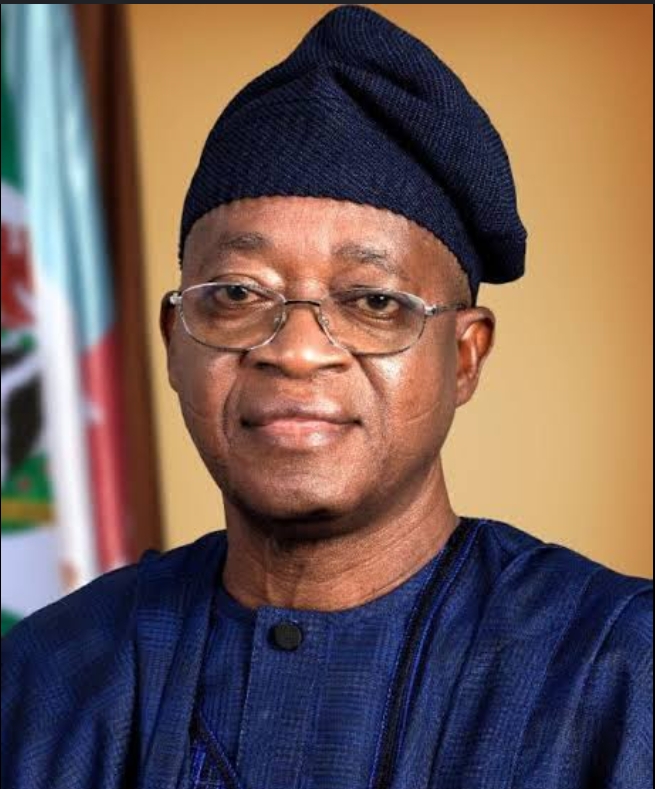
By Izuchukwu Ozoemena
Much as Nigeria cannot relegate to the background the human aspect in inland waterway operations, advanced monitoring and surveillance system remain the way to go to fully realize the country’s aims in this regard.
“There is need for our country to leverage on technologies such as satellite imagery, drones and sensors to enhance the ability to detect and respond to security threats real time. These tools not only help in preventing incidents but also assist in improving response time and minimizing the impact of any potential danger.”
Minister of Marine and Blue Economy, H.E. Adegboyga Oyetola disclosed this in Lagos, Thursday, in his keynote address at the Maritime Business Roundtable Breakfast Meeting hosted by Zoe Maritime Resources Ltd. The event whose theme was “Security & New Technologies In Inland Waterways Transportation” brought together a cross-section of industry stakeholders, regulators and representatives of foreign nations with far-reaching experiences in managing inland waterways security and technology.
Speaking through Mrs Selia Ekanem, the Ministry’s Deputy Director, Cabotage and Shipping Development, the Minister underlined the need to train and equip the manpower in the industry with needed skills and knowledge to effectively utilize the technologies in reference as this is as crucial as implementing the tools themselves. He assured that as part of the roadmap for inland waterway transport development in Nigeria, government places premium on the need to stimulate and promote growth in the subsector for more efficiency, connectivity and reliability.
Government, he stressed, must focus on areas such as dredging key waterways, construction of new ports and terminals, improving navigational aids and safety measures, regulatory reforms, use of new technologies, etc. To achieve these, he promised, government will continue to work with her relevant agencies to overcome perceived challenges while aiming at achieving a robust and sustainable growth.
“Also, active private sector engagement, participation as well as investment in the sector will ensure the sustainability, safety and utilization of our inland waterways for the growth and development of our economy.”
He acknowledged the need for more work in the sector to ensure a more sustainable growth, pledging the readiness of government to work to meet expectations.
Speaking through Hajia Eri, an Assistant General Manager with the National Inland Waterways Authority (NIWA), the regulatory agency’s Managing Director, Alhaji Munirudeen Oyebamiji stressed the need to sensitize stakeholders on global best standards in inland waterways operations.
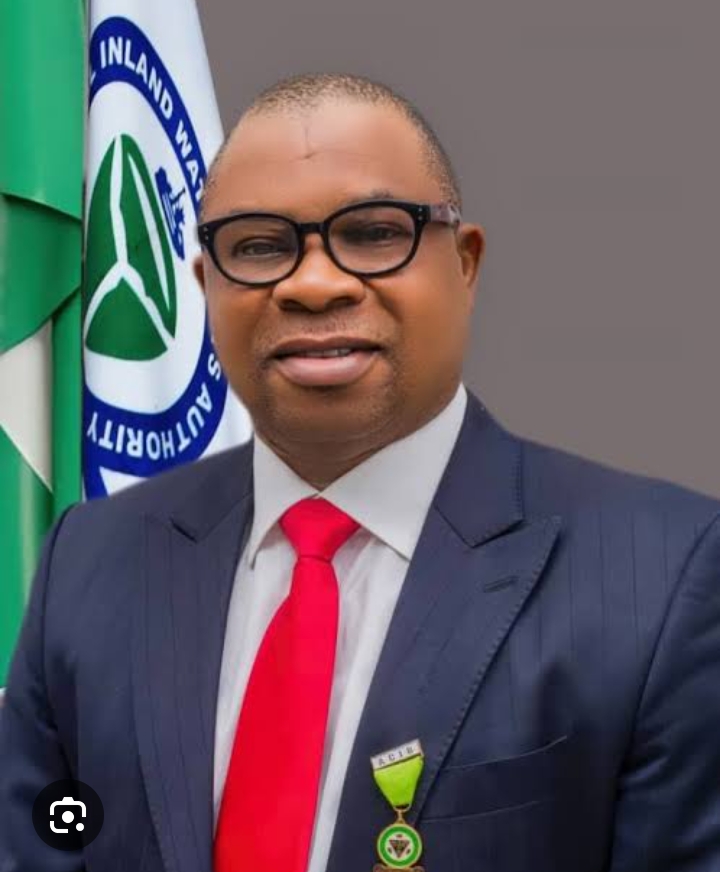
Alhaji Munirudern Olabamiji, MD,
NIWA
He said that NIWA maintains a robust partnership with the Police, Immigration Services, among other security agencies to maintain security on the nation’s inland waterways.
In her presentation, the Chinese Consul-General, Ms. Yan Yuqing urged Nigeria to urgently adopt digitalization and intelligence as major tools to drive security and technology on her inland waterways transportation. These, she said, have consistently made the Changjiang River in China become the world’s busiest inland waterway transportation route, known for its high volume of traffic.
She noted that with a lot of similarities Nigeria shares with China in terms of important rivers, river-ports, expansive coastlines and seaports, the country stands a good stead to learn the trick of successful inland waterway transportation management and marine conservation.
“In 2022, China’s inland waterway transportation completed a freight volume of more than 4.4 billion tons and goods turnover of 1.9 trillion ton-kilometers, highlighting the significant support for the regional economic development and social progress.”
“In the sector, quality productivity forces are innovation-led, oppose damage to the ecological environment, promoting the low-carbonization of economic and social development, and the collaborative development of high-quality economic development and high-level protection of the environment.”
“Currently, China has established transportation links with more than 100 countries and regions in the world, and the size of the fleet owned by China’s shipping companies has reached 249.2 million gross tons, becoming the world’s largest shipowning nation in terms of gross tonnage. Waterway freight accounts for about 17% of the national freight volume, while its cargo turnover accounts for about 54% of the total turnover in the transportation system.”
“Maritime transportation handles about 95% of China’s foreign trade volume and plays a key role in maintaining the safety and stability of both international and domestic logistics supply chains,” she posited.
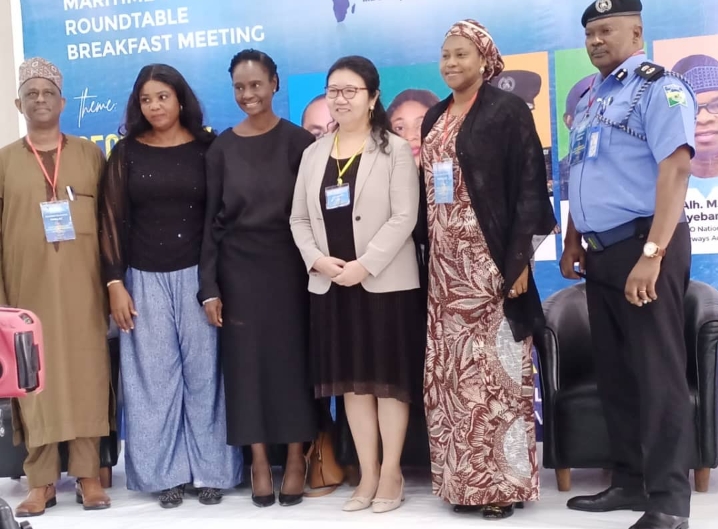
Some of the dignitaries at the April 18 Zoe Maritime Business Roundtable Breakfast Meeting in Lagos.
She recalled that NIWA has mandated boat captains to undergo mandatory training sessions as a condition for certification.
While pointing out the high volume of non-seaworthy boats and vessels operating on the waterways, she called for inclusion of boat operators in the CVFF crafts acquisition arrangement to enable them procure modern boats.
At the sidelines of the event, attendees who spoke to Falcon Watch Online querried the absence of boat operators such as ATBOWATON, the Lagos State Waterways Authority (LASWA) and other critical stakeholders.
In her remarks earlier, the Chief Executive Officer, Zoe Maritime Resources, Mrs. Oritsematosan Edodo-Emore said it is time Nigeria addressed numerous issues bedeviling inland waterways transportation in Nigeria.
Dignitaries in the event included Mr Temi Omatseye, ex- Director General, Nigerian Maritime Administration and Safety Agency (NIMASA); Senior Partner, Foundation Chambers, Mr. Chidi Ilogu (SAN); Founder, Ocean Ambassadors Forum (OAF), Mrs. Olaitan Williams and Secretary, Nigerian Maritime Law Association (NMLA), Mrs. Nneka Obianyor.
Others were: NPA’s General Manager (Security), Mr. Mohammed Khalil; CP Maritime Police, Olanrewaju Olawale Ishola (representing AIG Maritime Police Command, AIG Rhoda Olofu); Products Development Manager, Niger Benue Transport Company (NBTC), Engr. Uche Chibu who represented the NBTC Managing Director.
Maritime Agencies
Seme Customs Hits Big: Intercepts 10,000 Bags of Expired Flour, Cannabis; Facilitates 53, 989.47MT Exports in A Month
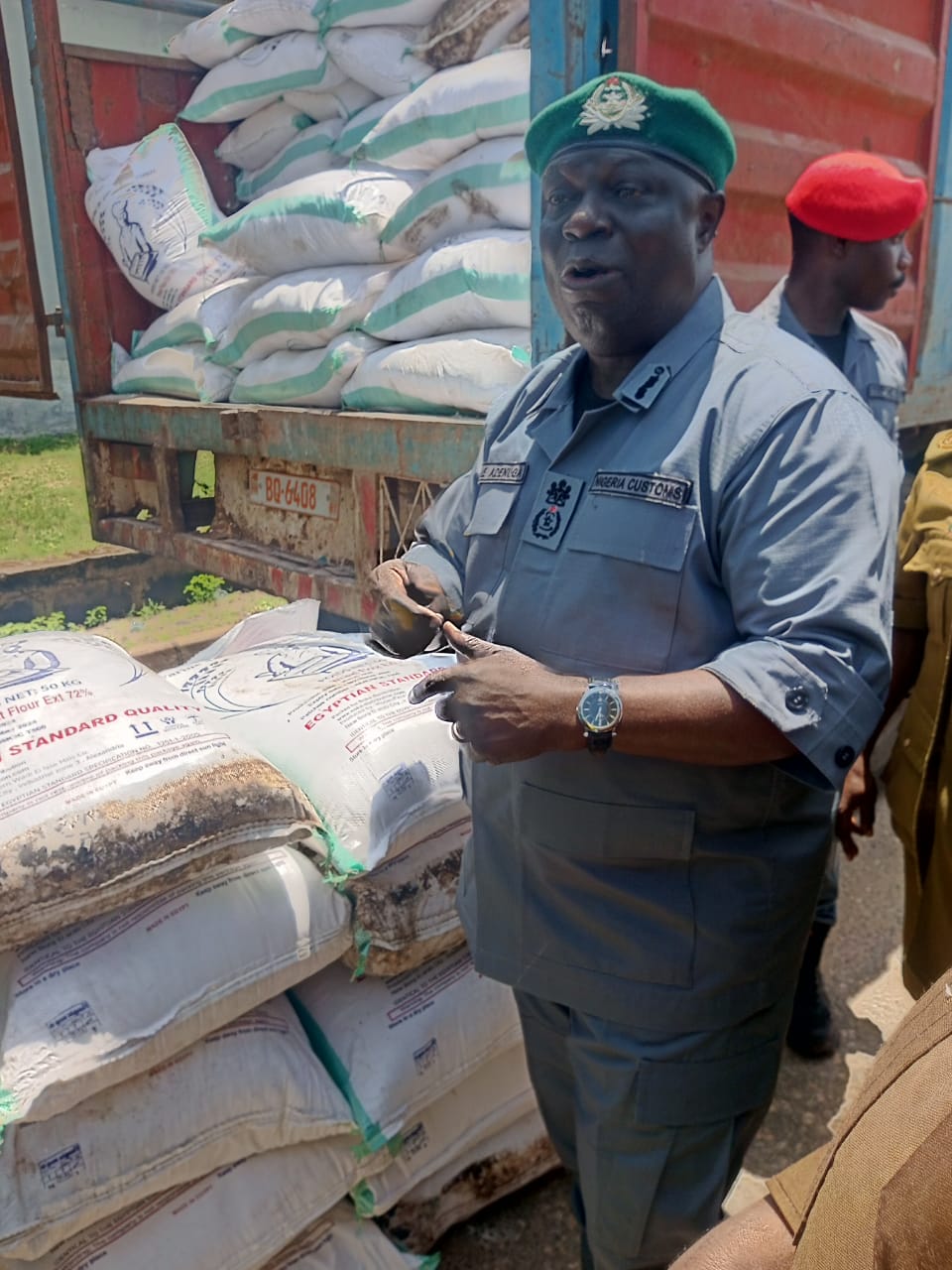
By Izuchukwu Ozoemena
“Guided by the CGC’s commitment to transparency and modernisation, the Seme Area Command has intensified efforts to simplify procedures, strengthen inter-agency coordination, and ensure that legitimate traders enjoy the full benefits of Customs modernisation and regional integration along the Lagos–Abidjan corridor”.
Comptroller Wale Adenuga, the Customs Area Controller (CAC), Seme Border Command gave this reaffirmation at the Seme-Krake border, Thursday, as he gave a rundown of recent exploits in revenue generation, anti-smuggling and trade facilitation.
In the month of September, 2025, the Command generated ₦1,500,029,233.88 in contrast to ₦531,462,332.45 collected in the corresponding period of 2024. This represents an increase of over 182%
Talking of exports, Seme Command facilitated the movement of 53,989.46 metric tonnes of goods with a Free on Board (FOB) value of ₦7,969,376,198.78 even as the total Nigeria Export Supervision Scheme (NESS) realization was ₦39,868,354.42.
The most significant seizure achieved through
credible intelligence and strong inter-agency collaboration was that involving five (5) trucks conveying a total of 10,000 bags of expired flour originating from Egypt, with a Duty Paid Value (DPV) of ₦1,210,300,000.00. The interception pulled through following a joint operation with the National Agency for Food and Drugs Administration and Control, NAFDAC.

Other seizures include 1,104 parcels of Cannabis Sativa and 120 packs of tramadol (120mg) seized alongside two suspects handed over to the NDLEA Seme Command on October 7th, 2025 for further investigation.
After a sting operation at sea, the Nigerian Navy seized over 2,043 bags of foreign parboiled rice (50kg each) and handed same over to Customs.
Other seizures showcased by Comptroller Adenuga were 150 bales of second-hand clothing,169 bottles of DSP Cough Syrup with Codeine and 5 used vehicles.
The total Duty Paid Value (DPV) for all seizures stands at ₦1,999,093,429.00.
Accepting the seized drugs on behalf of the DG of NAFDAC, the Seme Area boss, Dr Nurudeen Audu recalled that his agency has continued to synergise with the NCS in protecting the nation’s economy and checking the illegal entry of dangerous and expired pharmaceuticals into Nigeria. He added that “seized food items are usually sent to our laboratory at Oshodi for testing before they are allowed to be sold or taken to the internally displaced persons camps for distribution”.
On behalf of the leadership of the NDLEA, Ajoku Rita, Controller of Narcotics, said of the seized tramadol and cannabis sativa: “we are working together assiduously to make sure that these illegal drugs do not come in to wreck havoc on our youths”.
Concerning the means of conveyance of the seized items, Comptroller Adenuga assured of plans to dispose them soon as the CGC is averse to any kind of wastage.
Earlier in the week, the CAC hosted
traditional and youth leaders, sister-security agencies in the Seme-Krake border area, cross-border agencies from Benin Republic and the press to discuss the issue of numerous checkpoints along the busy Lagos -Badagry trade corridor and the need to reduce these as much as possible to enhance free movement and trade facilitation. He reported that within a short notice, stakeholders and various agencies complicated were already cooperating to ease movement of people and legitimate goods.
As far as the Nigeria Customs is concerned, he announced, only two checkpoints are approved on the Mile 2 to Seme border trade route. These are Agbara and Gbaji. However, there are one or two points where roving customs officers are sighted strictly for intervention and reinforcement. These are not answerable to Seme Command.
’Only God Is Wise’ bonded terminal under the supervision of the Command was inspected as the CAC directed.
According to the facility manager, Mr Adetoun Abidemi, the terminal which the command conceived began operations in 2019 for the purpose of improving trade facilitation.
Adetoun noted that the terminal handles general services and that examination of cargoes is presently done at 100%. He disclosed that for now, the terminal is operating at very low capacity as a result of low patronage. Abidemi called on all importers and exporters to use the bonded terminal facility while processing their cargoes.
Maritime Agencies
’MV DRAGON’: Freight Forwarders Group Hails Clarion Shipping, Stage A Roadshow
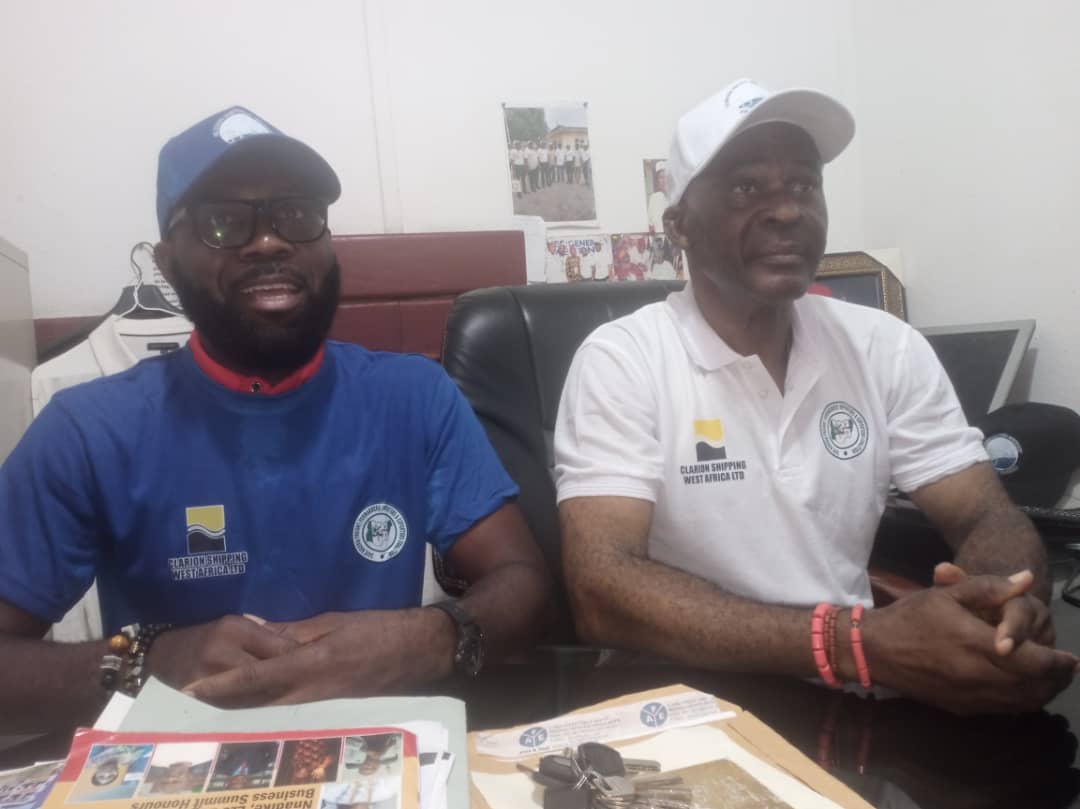
By Izuchukwu Ozoemena
With the recent unveiling of ‘MV Dragon’ by Clarion Shipping West Africa Ltd, a home-grown shipping outfit, there are clear signs that the glorious days of indigenous shipping have come to birth in Nigeria if the tempo can be sustained.
Licensed Customs Agent and Coordinator, ‘Save Nigeria Freight Forwarders, Importers and Exporters Coalition’, Chief Patrick Osita Chukwu disclosed this in Apapa, Lagos, Tuesday, during a road walk organized by his group in conjunction with other freight forwarders and concerned players in the shipping industry.
The procession which marched through Creek Road, Burma Road and Wharf Road and back to the popular Nnewi Building area of Apapa under a heavy downpour was to sensitize the public and raise needed awareness on the need for relevant authorities to intensify action on the development of indigenous shipping in Nigeria. The foot-dragging, Chief Chukwu noted, must stop in the interest of Nigeria and the good of her image worldwide.
Chief Chukwu recalled with great nostalgia the Nigerian National Shipping Line (NNSL) Ltd which became defunct years back. He said the indigenous shipping company with many ocean-vessels on her fleet ran aground following monumental mismanagement on the part of the authorities. The NNSL operated intercontinental shipping but later became defunct after which there no longer existed any proper indigenous shipping companies in the real sense of it till date.
But now Clarion Shipping West Africa Ltd has acquired ‘MV Dragon’, he said, it is a dream-come-through other entrepreneurs in shipping should hook up with for their business interests and the image of Nigeria as a maritime nation. “It is a first for indigenous shipping in Nigeria”, Chukwu announced.
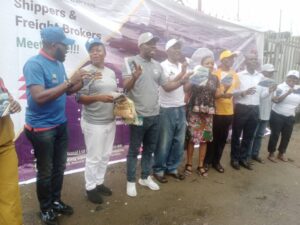
After the road walk…..
’MV Ocean Dragon’ is to engage in trans- shipping cargoes from the Lagos ports to other Nigerian ports as well as for regional shipping along the West African coast.
Clarion Shipping has also acquired a second vessel for intercontinental shipping. It is on its way to Nigeria to commence operations. The vessel, a 1,149 twenty-foot equivalent unit (TEU) container carrier will facilitate shipping between China and Nigeria to help bring in part of the 38% annual imports destined for Nigeria.
Speaking after the road show, Solomon Ogudo, Clarion Shipping’s Regional Manager, South-east Nigeria, said: “The addition of the vessel is geared towards solving most of the myriad of problems in the movement of cargoes within the country and the West African region”.
“One gets incentives of having $500 on every 40 footer container that you book with them and $300 on every 20 footer container booked with them”.
He promised that delays in cargo clearing would be substantially reduced by as much as 4 to 6 days.
Clarion Shipping being a wholly Nigerian-owned entity, Ogudo assured, there is no place for repatriation of funds as everything would be recycled in-country.
Maritime Agencies
TRADE FACILITATION: Seme Customs Hosts Joint Border Stakeholders’ Engagement To Deepen Cordial Relationships.
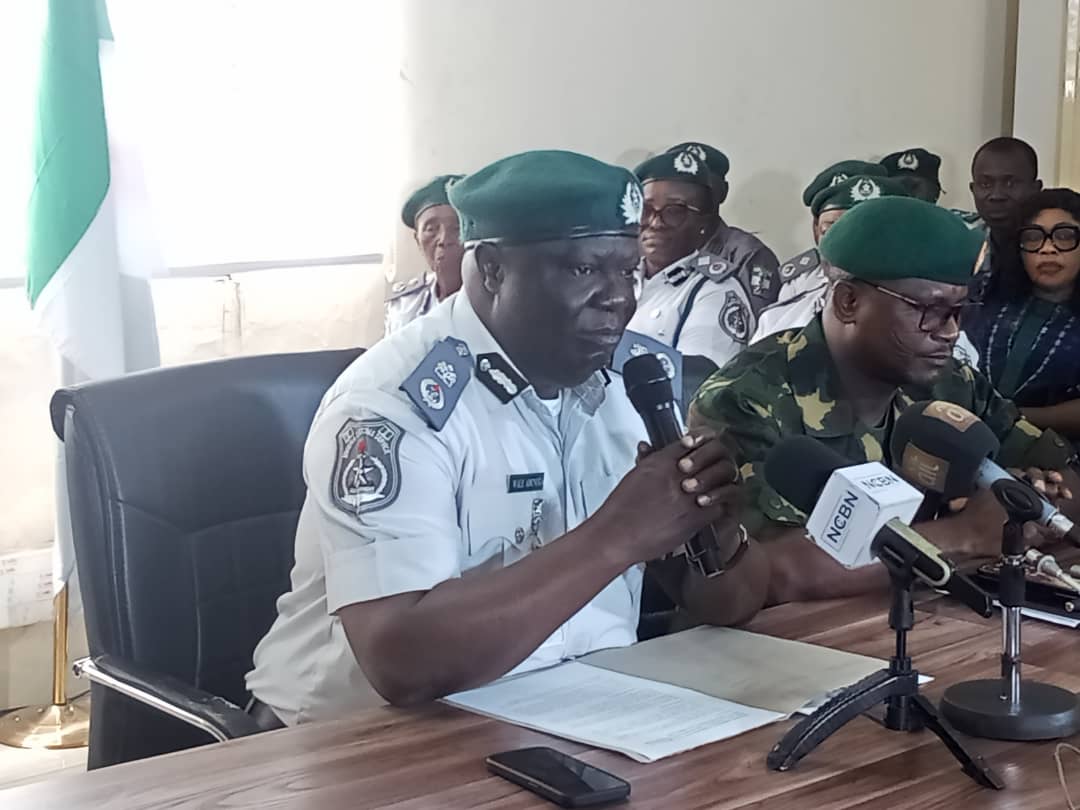
By Izuchukwu Ozoemena
The Seme Area Command of the Nigeria Customs Service, Monday, hosted a well-attended Joint Border Management stakeholders’ engagement to discuss major impediments to free flow of trade. In attendance were the Chargè d’affaires of the Nigeria Embassy to Benin republic, heads of sister security agencies such as the Air Force, Navy and the Nigerian Army. Others were heads of paramilitary agencies such as the Police, Immigration, Nigerian Quarantine Service, Federal Road Safety Corps including traditional rulers and various community heads. Freight forwarders and others attended and participated in the robust engagement. The Benin Republic Customs, traditional rulers and representatives of business communities along the trade corridor also recorded an impressive attendance.
The parley which was largely interactive was in pursuant of a standing mandate by the Comptroller General of Customs, Bashir Adewale Adeniyi, MFR, that all identified impediments to free flow of trade are eradicated in line with the extant laws and ECOWAS protocols of free movement of goods and persons.
In his opening remarks, the Customs Area Controller, Comptroller Wale Adenuga described the Seme-Krake border as strategic to trade in the West African sub region as it plays a critical role in intra- African trade under the African Continental Free Trade Area (AfCFTA).
The border post, he explained, holds great economic potentials to the benefit of citizens and traders from the two nations that share historic, cultural and trade relationships dating back to the pre-independence era.
Top on the list of identified impediments to trading along the corridor was the persistent presence of uncountable checkpoints mounted by state actors and non-state actors alike .
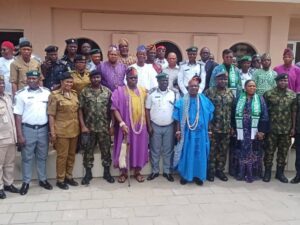
CAC Adenuga (centre) in a group photograph with traditional rulers, heads of security agencies and others.
In his presentation, Deputy Controller of Immigration Joseph Orji, who stood in for Peter Aduche, Head, Lagos State Border Patrol Team, attempted an explanation of their presence on the road, explaining that in the line of duty, Immigration deals with human beings. However, he admitted, it will be best for everyone to work with the fear of God. And when this happens, seamless trade facilitation takes place.
Chief Tunde Diro, a representative of the Akran of Badagry vocally condemned the multiplicity of checkpoints within short distances along the Badagry-Seme road and said it is disgraceful. A case in point Gbaji after the long bridge.
He deplored a situation where overlap of same functions exists with agencies and even non-state actors working at cross purposes to embarrass tourists and others on legitimate business.
Speaking, Hon Joseph Agoro, a community chief, equally deplored the level of harassment that commuters suffer in the hands of different agencies along the route insisting it was high time the menace was addressed. He lamented the level of indiscipline some officers exhibit and demanded urgent action. “Show us some respect and we shall return to you”, he declared.
Most speakers condemned the use of rude and insolent camp boys by different agencies to harass and extort money along the corridor. To overcome this, they advocated continuous training and inter-agency meeting. For instance, they lamented frequent unreasonable demands by some officers of the Nigerian Quarantine Service, an act that is crippling commodity trading businesses.
Contributing on behalf of the ECOWAS Business Forum, Mrs Omotola Amani focused on sexual harassment of the opposite sex who strive to grow their businesses along the corridor.
Other speakers called on various agencies to expand employment of the youths as a way to control restiveness. They also asked Customs to revive the abandoned Customs Secondary School project in Badagry as part of her corporate social responsibility.
Captain H.I. Maidugu of the Nigerian Air Force recalled that some unscrupulous persons use the corridor for human trafficking. Often times, many girls about to be trafficked have been intercepted at checkpoints. He announced that notwithstanding, any of his officers caught in dismeanour would always face stiff sanctions.
In the end, Comptroller Wale Adenuga itemised some of the resolutions which he promised to escalate to appropriate authorities for consideration. These included a reduction in the number of checkpoints along the route to make the corridor more business-friendly.
On employment, he made it clear that selection for Customs job is purely merit -based. External influence plays no role. He promised that Customs would revitalise the abandoned school project.
CAC Adenuga called on entrepreneurs top establish industries to tap into the abundant coconut in the area for the making of finished products as this would create job opportunities for the indigenous people especially the youths.
The engagement encouraged Nigerians and other nationals to get their National Identification Cards to avoid cases of embarrassment while transiting along the corridor.
The usual monthly inter-agency meeting, the CAC assured, is to be strengthened to deepen and expand the existing synergy.
He advised various communities to try to cooperate with all government agencies while their legitimate complaints would be addressed.
Comptroller Adenuga stressed that any officer or non-state actor caught impeding free movement of persons and goods that have met all formal conditions shall be arrested and prosecuted.
He urged all travelers and traders to bring their complainants to him directly or call the PRO for immediate and prompt action.
Truck examination, he said, shall be conducted at the designated examination bays to streamline the process of importation into Nigeria from the neighbouring country.
Head of Benin Customs at the Krake border, Lt. Col Arnaud Midgrokan, who doubles as Co-Chair of the JBP, appreciated Comptroller Adenuga for the meeting and expressed optimism that the engagement would open avenues to solutions for all identified challenges.
He promised cooperation and regular collaboration with his Nigerian counterpart to promote lawful commercial activities and continually ensure zero compromise to the joint agreements of both countries.
-
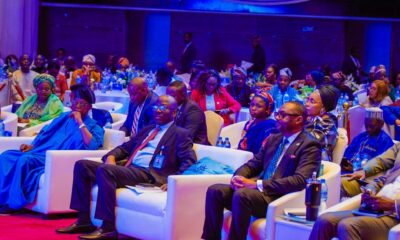
 Maritime Agencies3 weeks ago
Maritime Agencies3 weeks agoWMD 2025: Innovative Financing Is Key To Drive Nigeria’s Marine and Blue Economy, Says Oyetola. S
-
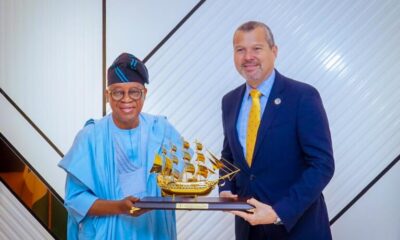
 Maritime Agencies2 weeks ago
Maritime Agencies2 weeks agoIMO Commends Nigeria’s Maritime Security Architecture, Blue Economy Policy.
-
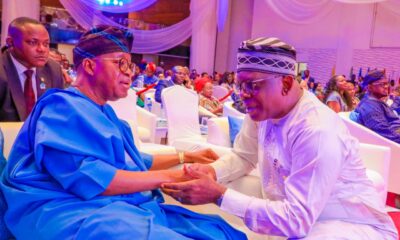
 Maritime Agencies3 weeks ago
Maritime Agencies3 weeks agoWMD 2025: Shippers’ Council Joins Global Community to Celebrate, Emphasizes Sustainable Blue Economy
-

 Maritime Agencies3 weeks ago
Maritime Agencies3 weeks agoSustained High Revenue: Tincan Customs Command Under Comptroller Onyeka A Test Case.
-
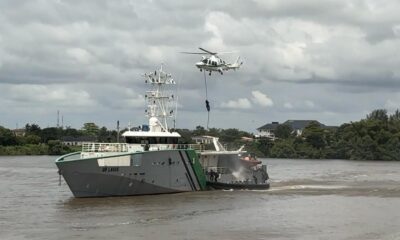
 Maritime Agencies1 week ago
Maritime Agencies1 week agoIMO Hails Nigeria’s Anti-piracy Arrangement, Recommends Same To Other Nations.
-
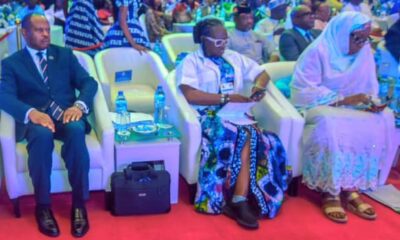
 Maritime Agencies3 weeks ago
Maritime Agencies3 weeks agoWMD 2025: MAN Oron Steals the Show As Cadets Bag Multiple Awards.
-
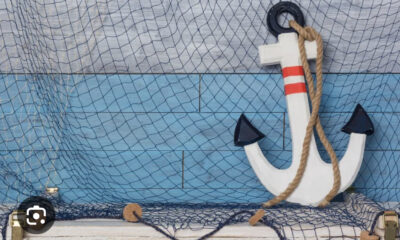
 Maritime Agencies3 weeks ago
Maritime Agencies3 weeks agoMaritime Journalists Associations Come Under One Umbrella, Form NNMI.
-

 Maritime Agencies2 weeks ago
Maritime Agencies2 weeks agoABUJA INTERNATIONAL TRADE FAIR: Abuja’s Location, Agro-allied Potentials Favour Non-oil Revenue, says NPA.


